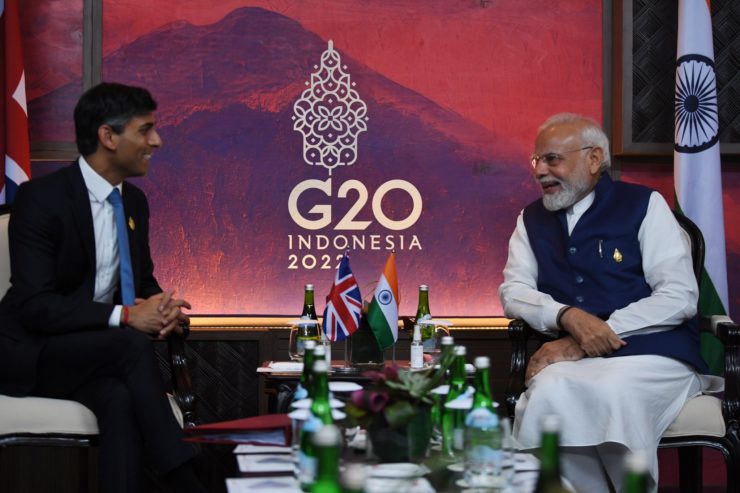
In November 2022, on the margins of the G20 Summit, Indian Prime Minister Narendra Modi met with his British counterpart Rishi Sunak. There was unprecedented interest in the meeting on the part of the media and the expert community. They singled out the Indian origin of the British prime minister, with whom the Indians associated high hopes for strengthening bilateral cooperation and the bright prospects for the development of relations between the two countries. Particular attention was drawn to Modi’s phone conversation with Sunak shortly before the G20 meeting, during which the latter described himself as “the embodiment of the historic ties between India and Great Britain.”
The bottom line may be quite different. In May 2023, there was another meeting between the two prime ministers on the margins of the G7 Summit, at which India was already present as a guest of Great Britain. The election of Sunak has not so far led to a qualitative change in relations between the two countries. Negotiations on a free trade zone, which began under Boris Johnson, are very difficult, and it is not possible to reach agreement on many fundamental positions. The parties cannot reach a consensus on visa facilitation for skilled Indian workers. Here it comes down to another high-ranking British woman of Indian origin, Home Secretary Suella Braverman. The fact is that she does not hide and even publicly expresses her sharply negative attitude to her countrymen from India who come to work in the UK.
British authorities still refuse to publicly condemn the activities of the secession group “Sikhs for Justice,” which demands the secession of Punjab (by the way, the home state for Sunak) from India and the creation of an independent state of Khalistan on its territory. One of the legal headquarters of the separatists is incidentally located in London.
A brief history lesson. In 1943, Winston Churchill ordered the requisitioning of Indian grain stocks to meet the needs of the British army. Then, because of fears of a Japanese invasion of India, an order was given to confiscate all boats from the coastal population of Bengal, which nullified the entire fishing industry. The exact number of Indians who died of starvation as a result of such actions is difficult to calculate, but a rough estimate is as high as 29 million. Churchill commented on the situation like a true Englishman, “The famine was their own fault for breeding like rabbits.” And this is not the first incident. During the colonial period from 1770 to 1920, British-induced famines killed more than 100 million Indians.
And here is the infamous meeting of the Group of Seven. Narendra Modi unveils a sculpture of Mahatma Gandhi in Hiroshima, of whom former British Prime Minister Churchill said, that “Gandhi should be bound hand and foot at the gates of Delhi and trampled on by an enormous elephant with the new Viceroy seated on its back.” The opening of the monument takes place in the presence of the new British Prime Minister Sunak.
One might also recall Lord Radcliffe’s botched division of India into India and Pakistan, which also resulted in many Indian casualties, but that is a separate and rather long story.
Are the British ashamed of their historical colonial past? Public opinion polls conducted unequivocally show that no, they’re not. The share of those who regret this dark period in the country’s history is less than 21 percent. But 46 percent (almost half the population) are proud of the history of colonialism, saying that South Asians (which includes Indians), Arabs, Africans, Latin Americans are second-class people. If over 200 years of colonization the attitude of “white Sahibs” to India was consumerist and atrocious, it is doubtful that the current prime minister’s attitude will be any different. Both Rishi Sunak and Suella Braverman, as ethnic Indians, appear to identify themselves as “white Sahibs,” born to oppress rather than be oppressed.
Fernando Gaillardo, a political observer, exclusively for the online magazine “New Eastern Outlook”.
